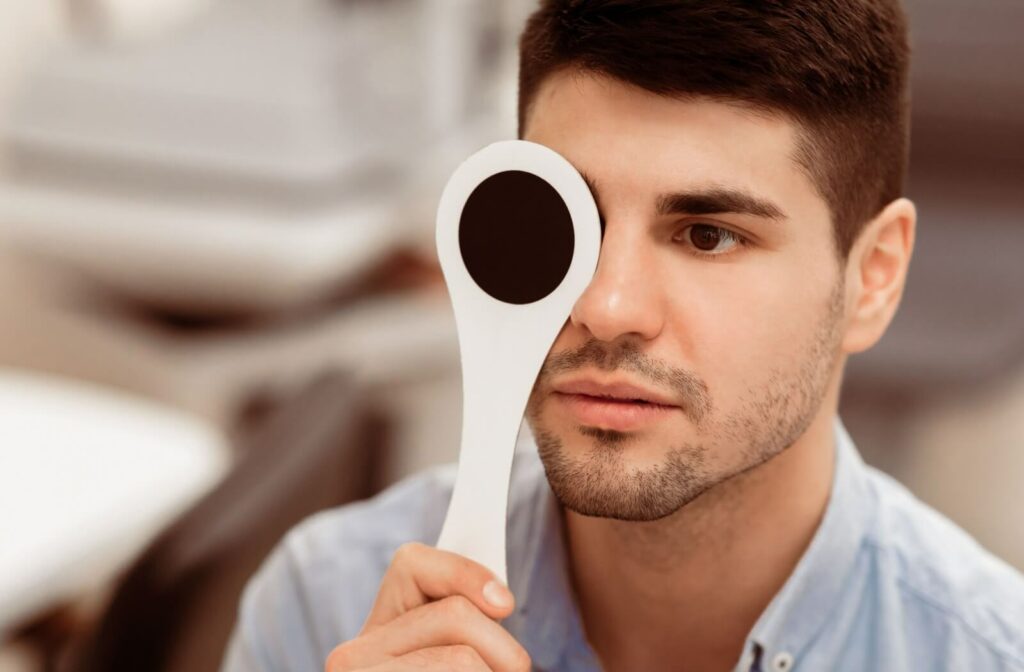Astigmatism is one of the most common refractive errors diagnosed during an eye exam. It can cause blurry, distorted, or fluctuating vision, and for many people, it’s a lifelong condition. But if you’ve been noticing changes in your vision, you might be asking: can astigmatism get worse over time?
The short answer is yes – astigmatism can change or worsen over time due to factors like aging, eye injuries, or changes in the shape of your cornea. But worsening astigmatism doesn’t always mean something is wrong, and in most cases, it can be easily managed with regular eye exams and updated prescriptions. With the right vision correction options, astigmatism can be managed comfortably at any age.
What Is Astigmatism?
Astigmatism happens when the cornea or lens of the eye isn’t perfectly round. Instead of being shaped like a basketball, it’s shaped more like a football, with one curve steeper than the other. This irregular shape causes light to focus unevenly on the retina, which leads to blurry or distorted vision.
Some people are born with astigmatism, while others develop it later in life. It often occurs alongside nearsightedness (myopia) or farsightedness (hyperopia).
Signs of Astigmatism
You may already know you have astigmatism if your optometrist has diagnosed it during a comprehensive eye exam. But for those unsure, here are some signs to look out for:
- Blurry or fuzzy vision at all distances
- Eye strain or fatigue
- Headaches, especially after reading or screen time
- Squinting to see clearly
- Difficulty seeing at night
These symptoms can overlap with other vision issues, which is why a eye exam is the best way to confirm what’s going on.
Can Astigmatism Worsen Over Time?
Astigmatism isn’t always static. Like other aspects of our health, it can shift as our eyes change, especially with age. Several factors can influence whether astigmatism worsens and how noticeable those changes might be.
Natural Aging
As we age, the shape and flexibility of the cornea can shift. This can cause astigmatism to gradually increase, especially for those over 40. These changes are typically slow and manageable, but they may require more frequent updates to your glasses or contact lens prescription.
Eye Conditions Like Keratoconus
In rare cases, a condition like keratoconus, where the cornea thins and bulges into a cone shape, can cause astigmatism to become significantly worse. This condition usually starts in adolescence and can progress over time. Fortunately, keratoconus is treatable with options like gas-permeable lenses or corneal cross-linking, but early detection is important.
Eye Injury or Surgery
Trauma to the eye or certain eye surgeries can alter the shape of the cornea, resulting in a change in astigmatism. In some cases, the effects are temporary, while in others, they may lead to long-term changes in vision that require a new prescription or specialty lens options.
Poor Vision Habits
While you can’t cause astigmatism by reading in the dark or staring at your screen, digital eye strain and poor visual hygiene can make underlying symptoms more noticeable. If your vision feels like it’s getting worse, an eye exam can help determine whether it’s due to prescription changes, eye strain, or a combination of both.
How Is Astigmatism Measured?
During a comprehensive eye exam, your optometrist will perform a series of tests to assess how light enters your eyes and how well you can see at various distances.
These may include:
- Autorefractor testing: Measures how light changes as it enters the eye
- Keratometry: Examines the curvature of the cornea
- Refraction tests: Helps determine your exact lens prescription
- Visual acuity tests: Like the classic eye chart, this helps gauge your overall clarity of vision
These tools allow us to measure the degree of astigmatism and recommend the best vision correction options for your needs.
Can You Prevent Astigmatism from Worsening?
There’s no guaranteed way to prevent astigmatism from changing, especially when it’s tied to natural eye aging. However, there are steps you can take to stay ahead of changes and protect your eye health.
Regular Eye Exams
Keeping up with your annual eye exams is the most important way to monitor any changes in your vision. It’s important to find an optometry clinic that doesn’t just check your prescription, but takes the time to understand how your vision is impacting your day-to-day life and whether changes might be on the horizon.
Protective Eyewear
If you’re active in sports or work in environments with a risk of eye injury, wearing protective glasses can reduce your chances of developing post-injury astigmatism.
Vision-Friendly Habits
Simple habits, like taking screen breaks, maintaining good posture, and keeping your prescription current, can help minimize symptoms and keep your eyes more comfortable throughout the day.

Treatment Options for Astigmatism
Astigmatism is usually very manageable with the right prescription and vision care plan. Treatment options include:
- Prescription eyeglasses: These correct uneven light refraction and provide crisp vision at all distances.
- Contact lenses: Optometrists offer soft toric lenses or gas-permeable options.
- Specialty lenses: Some patients benefit from custom lens designs that offer greater clarity or comfort.
- Refractive surgery: Procedures like LASIK can reshape the cornea to reduce or eliminate astigmatism, though not everyone is a candidate.
Your optometrist will work with you to determine the most comfortable and effective solution based on your lifestyle and vision goals.
Visit Verona Vision Care for Personalized Eye Care
At Verona Vision Care, we believe eye care is about more than just clear vision – it’s about understanding your unique needs and helping you feel confident in how you see the world. Whether your astigmatism is mild, moderate, or progressing, we’re here to offer personalized support and solutions that work for you.
Astigmatism doesn’t have to hold you back from seeing clearly or comfortably. Whether it’s a minor update or a major shift, our team at Verona Vision Care in Verona, WI is here to support you at every stage of your vision journey.
Schedule your next eye exam today and experience care that’s thorough, friendly, and focused on you.




